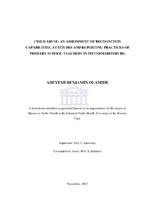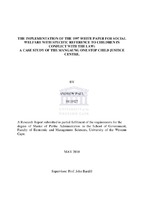| dc.contributor.advisor | Sloth-Nielsen, Julia | |
| dc.contributor.author | Anyikame, Hans Awuru | |
| dc.contributor.other | NULL | |
| dc.date.accessioned | 2014-03-06T13:23:30Z | |
| dc.date.available | 2013/04/10 | |
| dc.date.available | 2013/04/10 11:09 | |
| dc.date.available | 2014-03-06T13:23:30Z | |
| dc.date.issued | 2011 | |
| dc.identifier.uri | http://hdl.handle.net/11394/2918 | |
| dc.description | Magister Philosophiae - MPhil | en_US |
| dc.description.abstract | It is an unfortunate and cruel reality that both government and armed groups used child soldiers during armed conflict. Child soldiers have become an integral part of government forces as well as insurgent groups in Africa and elsewhere. Most of them are being exploited as combatants, while others perform functions, such as porters, spies who are able to enter small spaces, cooks, messengers, lookouts, and even suicide bombers. Some of the most disturbing aspects of child soldiering are that some of them are being forced to kill or are themselves killed, sexually abused and are exposed to drugs. The use of child soldiers in conflicts is not a recent phenomenon and has indeed become a common practice that characterises modern conflicts. Recruitment is usually carried out forcefully or voluntarily by both government and rebel forces. The difference between these two types of recruitment is not always clear since their decision to join is always influenced by external factors. Examples of such reasons for voluntary recruitment include the desire to revenge, adventure, peer pressure, and need for belonging and survival. Concerning the reason for survival, some argue that, the children do not actually choose freely to become combatants, but are rather forced by circumstances. There are numerous reasons for the continuous targeting of children by armed forces and armed groups. These include shortage of combatants, the fact that children are easy to train physically and psychologically, and also that children are obedient and are readily available. The recruited children are compelled to take part in brutal induction ceremonies, where they are threatened and forced to kill or witness the killing of someone they know. | en_US |
| dc.language.iso | en | en_US |
| dc.publisher | University of the Western Cape | en_US |
| dc.subject | The convention of the rights of the child | en_US |
| dc.subject | The committee on the rights of the child | en_US |
| dc.subject | Child soldier | en_US |
| dc.subject | Small arms and light weapons | en_US |
| dc.subject | Human rights law | en_US |
| dc.subject | African Charter of the Rights and Welfare of the Child | en_US |
| dc.subject | UN security councils | en_US |
| dc.subject | Conflict transformation | en_US |
| dc.subject | The special representative the UN Secretary General for children and armed conflict | en_US |
| dc.subject | Armed conflict | en_US |
| dc.subject | UN program of action | en_US |
| dc.subject | The UN security council resolution | en_US |
| dc.title | The role and effect of small arms in the recruitment of child soldiers in Africa: can the international law be strengthened? | en_US |
| dc.rights.holder | Copyright: University of the Western Cape | en_US |
| dc.description.country | South Africa | |




